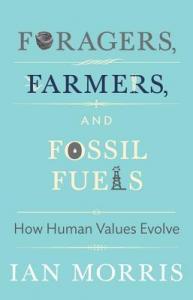 Foragers, Farmers, And Fossil Fuels: How Human Values Evolve
Foragers, Farmers, And Fossil Fuels: How Human Values Evolve
Princeton University Press, 2015
Agent: Sandra Dijkstra
Most people in the world today think democracy and gender equality are good, and that violence and wealth inequality are bad. But most people who lived during the 10,000 years before the nineteenth century thought just the opposite. Drawing on archaeology, anthropology, biology, and history, Ian Morris explains why. Fundamental long-term changes in values, Morris argues, are driven by the most basic force of all: energy. Humans have found three main ways to get the energy they need--from foraging, farming, and fossil fuels. Each energy source sets strict limits on what kinds of societies can succeed, and each kind of society rewards specific values. But if our fossil-fuel world favors democratic, open societies, the ongoing revolution in energy capture means that our most cherished values are very likely to turn out not to be useful any more. Foragers, Farmers, and Fossil Fuels offers a compelling new argument about the evolution of human values, one that has far-reaching implications for how we understand the past--and for what might happen next. Originating as the Tanner Lectures delivered at Princeton University, the book includes challenging responses by classicist Richard Seaford, historian of China Jonathan Spence, philosopher Christine Korsgaard, and novelist Margaret Atwood.
Reviews:
"Excellent and thought-provoking. . . . More important, by putting forth a bold, clearly formulated hypothesis, Morris has done a great service to the budding field of scientific history."
—Peter Turchin, Science
"A provocative explanation for the evolution and divergence of ethical values. . . . In the hands of this talented writer and thinker, [this] material becomes an engaging intellectual adventure."
—Kirkus Reviews
"A very good and enjoyable read."
—Diane Coyle, Enlightened Economist
"Stimulating."
—Russell Warfield, Resurgence & Ecologist
"Ian Morris has thrown another curveball for social science. In this disarmingly readable book, which takes us from prehistory to the present, he offers a new theory of human culture, linking it firmly to economic fundamentals and how humans obtained their energy and resources from nature. This is bold, erudite, and provocative."
—Daron Acemoglu, coauthor of How Nations Fail: The Origins of Power, Prosperity, and Poverty
"Ian Morris has emerged in recent years as one of the great big thinkers in history, archaeology, and anthropology, writing books that set people talking and thinking. I found delightful things in every chapter of Foragers, Farmers, and Fossil Fuels, interesting enough that I found myself sharing them with family over dinner. The breadth of reading and the command of the subject are just dazzling. His major argument--that value systems adapt themselves to ambient energy structures, in the same way that an organism adapts to its niche--is fascinating."
—Daniel Lord Smail, author of On Deep History and the Brain
"This is an important and stylistically excellent book written from a sophisticated materialist perspective. It is eminently readable, lively, and with clearly stated arguments explored in a systematic fashion. In a sense, it follows up on Jared Diamond's work on agricultural origins, and it parallels Steven Pinker's book on warfare in depicting a world that is culturally evolving in a certain direction. Foragers, Farmers, and Fossil Fuels should have a serious impact."
—Chris Boehm, author of Moral Origins: The Evolution of Altruism, Virtue, and Shame